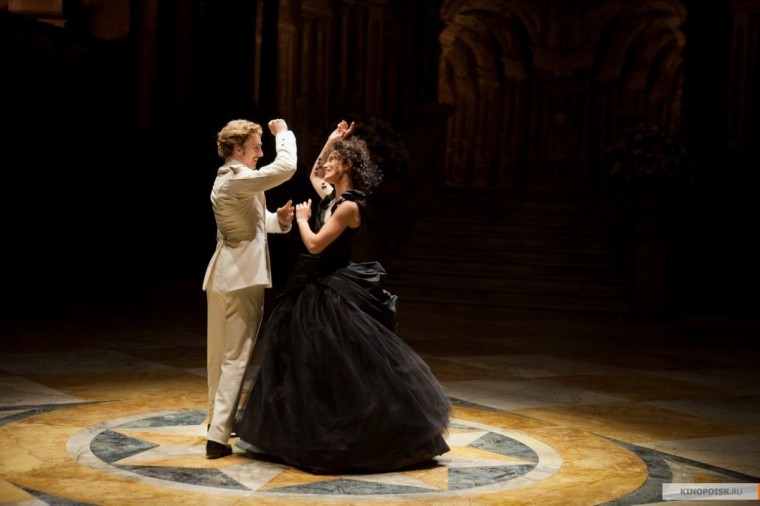
Joe Wright’s unique vision breathes life into the source material but he highlights the wrong aspects of the narrative
Leo Tolstoy’s Anna Karenina is a great work of literature and director Joe Wright’s (Hanna) adaptation is very nearly a great film, but both suffer from one inescapable flaw: The title character is kind of insufferable.
Well, that’s not entirely true — rather, she becomes insufferable over the course of the film’s more than two-hour runtime. As played by Keira Knightley (Seeking a Friend for the End of the World), she enters the film as a bright, lively and thoroughly likable young woman caught in a largely loveless marriage (husband Karenin is played by Sherlock Holmes: A Game of Shadows’ Jude Law) she’s learned to make the most of.
The fragile status quo is upset with the arrival of dashing cavalry officer Vronsky (Aaron Taylor-Johnson, Savages) who takes a flirtatious interest in Anna that grows more daring and difficult to resist every day. She rebuffs him, but his persistence — and the steamy, hot-blooded release from propriety and unrealized passions he offers — wears her down. Their affair allows them to indulge in desires taboo in the religious society of the late Russian empire, but also reduces Anna to a pariah.
Tolstoy’s novel is thematically rich — the narrative serves to question the morality of privilege in a fading empire and whether civilized society can tame humanity’s baser appetites — but, in Wright’s hands, it largely adds up to so much melodrama. It’s lavish, involving melodrama — at least in the film’s first half — but melodrama nonetheless. Echoes of Tolstoy’s subtext remain, but the sweeping romance takes center stage.
Wright, who has a well-deserved reputation as one of the few directors of dignified literary adaptations with a real sense of style (see Atonement’s Dunkirk long take as evidence), dresses the film up in bold visuals that constitute the film’s most interesting element. He stages most of the action as if it were a Broadway musical: Much of the film is set on an actual stage, extras move in unison as if they’re background players in a dance number, musicians wander the frame to score scene changes. And so on.
He uses every cinematic trick in the director’s handbook, sending his camera flying across the set, crosscutting between related moments and cramming the frame with period details of symbolic and historical import. Such ambition could easily lead to visual overload, but, in Wright’s skilled hands, it gives the plot a propulsive, vibrant energy.
He takes his foot off the stylistic pedal in the film’s second half, however, increasingly relying on location shoots, realistic sets and flat shot-reverse-shot conversations, draining the film of the kineticism that made it so engaging. There’s reasoning behind this — the theatrical artificiality of infatuation gives way to the realism of a day-to-day relationship — but it doesn’t make the shift any less disappointing.
And it’s in this second half that Anna becomes so hard to watch. Her mental and physical health deteriorates and she becomes increasingly paranoid, irrational and shrill. As her life collapses, it becomes clear her relationship with Vronsky is of little substance and that the entire narrative has been set in motion by little more than a schoolgirl crush.
That’s not to say that watching someone’s life collapse over a crush can’t be interesting — on the contrary, it can be quite fascinating. The issue is Anna Karenina doesn’t handle it all that well, pushing its characters away from relatability and losing its grasp on their humanity as it progresses.
It suffers in comparison to Terence Davies’ The Deep Blue Sea, also released this year. The films are broadly similar — both are sumptuous period pieces concerned with a woman torn between loyalty to a dutiful but dull older husband and an affair of the heart with an attractive younger officer — but The Deep Blue Sea is both more intellectually compelling and emotionally affecting. It’s a keenly observed character study, while Anna Karenina is pure operatic melodrama, all grand emotions and little subtlety.
That operatic melodrama is an element of the novel, of course, so Wright can’t entirely be blamed, but neither can it be said that he overcomes Tolstoy’s weaknesses and highlights his strengths. His daring style manages to breathe new life into somewhat warmed-over source material, but he ultimately succumbs to its inherent flaws.
diversionsdbk@gmail.com



